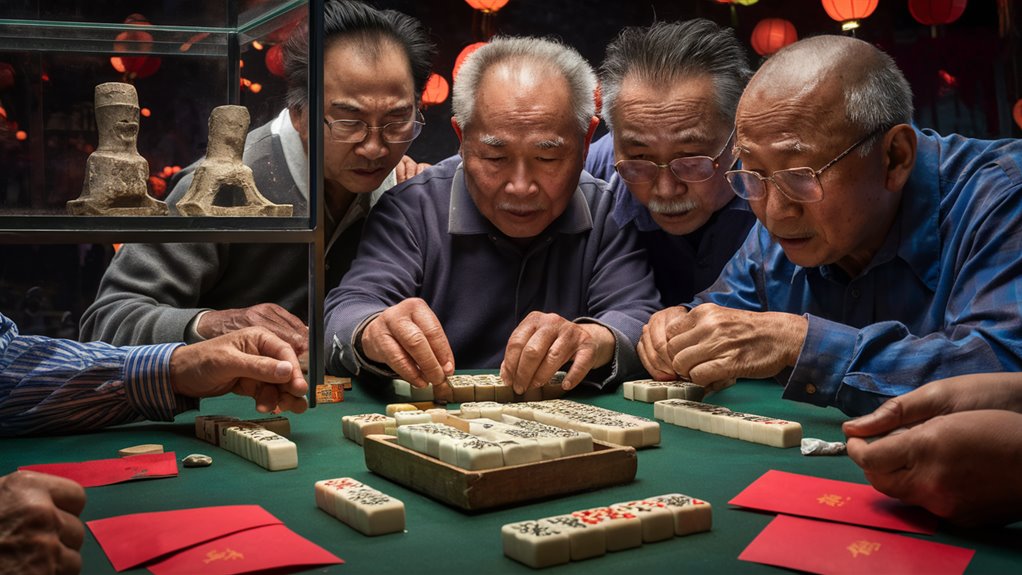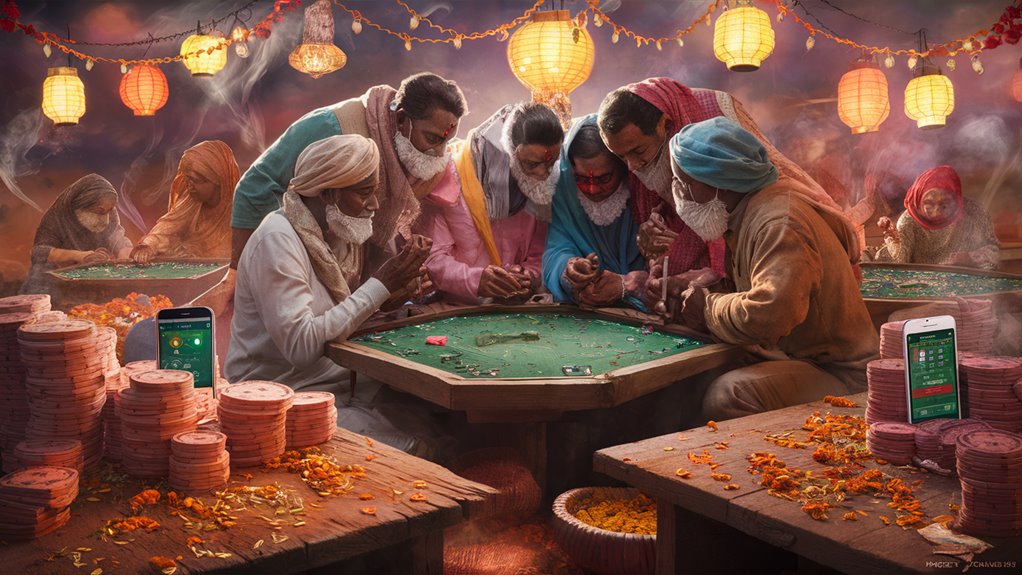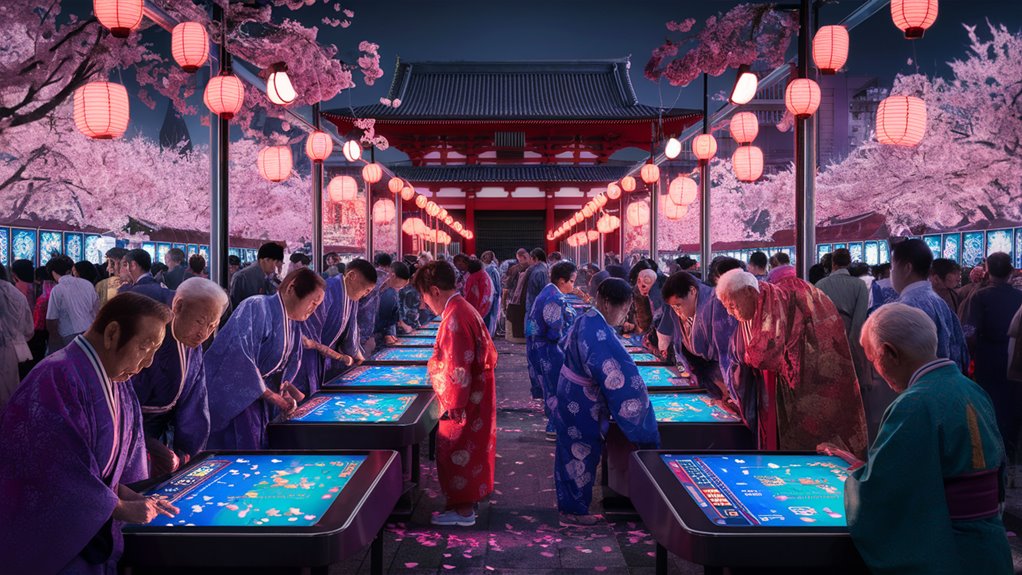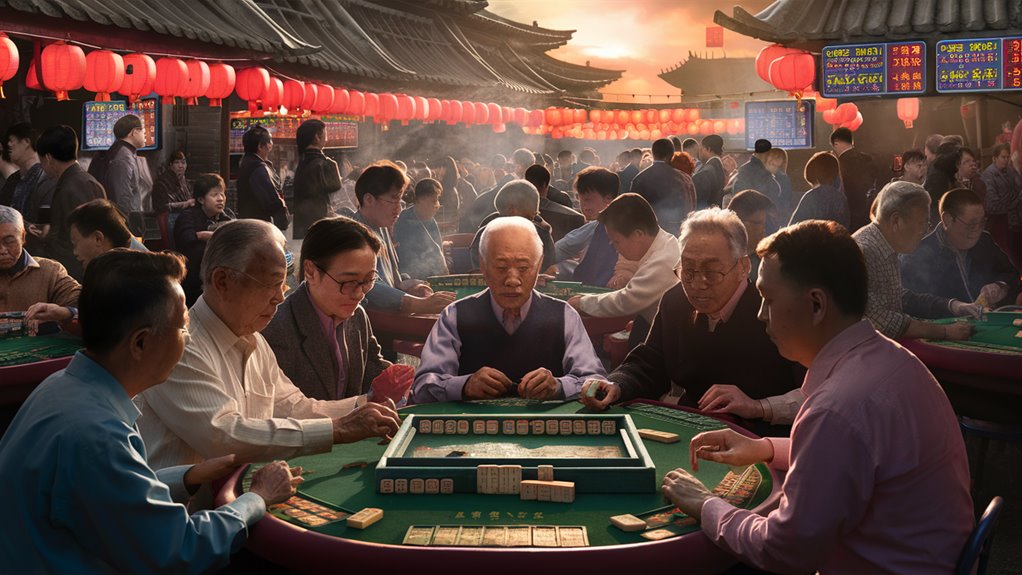Let's talk about how cultural festivals have shaped the way people gamble throughout history. You know how these colorful celebrations bring communities together? Well, they've also been perfect settings for gambling traditions to take root and grow. Think about it – from simple dice games at local fairs to elaborate card tournaments during seasonal festivals, gambling has always found its place in these cultural gatherings.
What's really interesting is how these traditional betting practices have evolved over time. Back in the day, you'd see people huddled together, maybe throwing dice or playing cards face-to-face during festival nights. It was all about that personal connection, the thrill of competition, and being part of something bigger than yourself.
Fast forward to today, and things look quite different. Sure, the core excitement remains the same, but now technology has added a whole new dimension to festival gambling. You might find people at modern cultural celebrations using their phones to place bets while still enjoying traditional games with their friends and family. It's like watching old meets new, right there in front of you.
But this brings up some fascinating questions about keeping traditions authentic. Can age-old gambling customs survive in our digital world without losing their cultural significance? The answer isn't simple, but what we're seeing at festivals nowadays suggests that people are finding creative ways to balance both worlds.
Historical Festivals and Gambling Origins

Let's dive into the fascinating world of ancient gambling and festivals. You know how we've our modern casino games and sports betting? Well, the roots of these practices go way deeper than you might think.
Picture this: ancient Greek Olympics, with crowds of excited spectators not just cheering but placing bets on their favorite athletes. Pretty familiar, right?
The Romans took it even further during their Saturnalia festivals, where everyone, rich or poor, could try their luck at games of chance. People back then truly believed these games could reveal messages from the gods, making gambling a seriously spiritual affair.
The story gets even more interesting when you look at Asian traditions. Take China, for instance, where popular games like mahjong and keno started as festival activities.
In India, ancient celebrations included dice games so important they made it into their epic stories like the Mahabharata. Native American tribes had their own spin on things too, using gambling ceremonies to figure out everything from next season's harvest to settling disputes between communities.
But here's the really cool part: these weren't just games for fun. Think about it as an ancient version of networking and problem-solving rolled into one.
People used festival gambling to build trading partnerships, work out their differences, and spread wealth around their communities. And if you look closely at modern cultural celebrations, you can still spot traces of these age-old traditions in how we gamble today.
These practices weren't just random entertainment, they were clever solutions to social challenges. Actually, they worked so well that some of their basic principles still show up in how we use gambling during celebrations today, though maybe with less divine intervention involved!
Festival Betting Around the World

You know how every culture has its own special way of celebrating? Well, the same goes for festival betting, and it's pretty fascinating how different places put their own spin on it.
Take Chinese New Year, for instance. While families are busy sharing dumplings and lighting firecrackers, you'll often find people gathered around tables playing mahjong tournaments or exchanging red envelopes with friendly wagers inside.
Over in Spain, the Christmas season brings something entirely different, with practically the whole country getting caught up in the excitement of El Gordo lottery.
The betting traditions in Asia are particularly interesting. Japanese festivals come alive with hanafuda card games, where players try their luck matching beautiful seasonal flower cards.
In Thailand, the Songkran water festival isn't just about getting soaked, it's also when muay Thai betting reaches its peak.
And if you've ever been to India during Diwali, you might've seen families and friends enjoying spirited rounds of teen patti with some playful betting on the side.
Latin American carnival season brings its own flavor to festival betting. Card games are huge, and though it mightn't be everyone's cup of tea, traditional cock fighting still draws crowds of eager bettors in some regions.
Meanwhile, if you find yourself in Ireland during summer, you can't miss the electric atmosphere of the Galway Races, where betting on horses has been a beloved tradition for generations.
Things are changing with the times, though. These days, you can actually tap into traditional festival betting through your phone, with apps designed specifically for cultural celebrations.
It's pretty cool how technology lets people keep these betting traditions alive, even when they're far from where the festivals are happening.
Digital Transformation of Cultural Gaming

Let's talk about how the digital world has completely changed the way we enjoy traditional cultural games. You know those fun festival games you might remember playing with family and friends? Well, they've found a new home in the digital space, and it's pretty amazing how seamlessly they've made the jump.
Think about it – you can now pull out your phone and join a Diwali card game with players from Mumbai, challenge someone in Hong Kong to a mahjong match, or try your luck at virtual pachinko without stepping foot in Japan. Pretty cool, right?
These digital platforms have done a fantastic job of keeping what makes these games special while adding some modern twists. Want to chat with other players? There's voice chat for that.
Curious about different strategies? Jump into a live stream and watch the pros play. The best part is you're not just playing, you're actually learning about different cultures and traditions along the way.
But here's what really makes this digital shift interesting: it's not just about making games more accessible. These platforms have introduced some clever features that weren't possible before.
They've got smart security systems to keep everything fair, tools to help you play responsibly, and even age checks to keep the younger folks safe. And if you're into cutting-edge tech, virtual and augmented reality are taking things to a whole new level.
Imagine celebrating Chinese New Year in a virtual festival while playing traditional games with people from across the globe – all from your living room!
Social Impact on Betting Behaviors

Let's talk about how social connections shape our betting habits, especially during festivals. You know how cultural celebrations have always brought people together? Well, nowadays, smartphones and betting apps have added a whole new dimension to these gatherings.
Think about the last festival you attended. Chances are you noticed groups of friends huddled around their phones, placing bets together on various games or events. It's fascinating how these digital platforms have become such a natural part of our festival experience, right? Social media and instant messaging have totally changed the game, making it super easy to join betting pools with both friends and complete strangers.
The interesting thing is, when we're at festivals, we tend to make different betting choices than we might on our own. Maybe it's the excitement in the air, or perhaps it's seeing our friends place their bets.
Whatever the reason, there's something about being in a crowd that influences our decisions. Picture this: you're at a cultural festival, surrounded by friends, and someone suggests joining a betting pool. The combination of traditional festivities and modern technology creates this unique atmosphere where cultural heritage meets digital convenience.
But here's what's really fascinating – these social connections aren't just changing how we bet, they're creating entirely new ways for us to interact during festivals. We're seeing people blend age-old festival traditions with modern betting practices, creating these interesting hybrid experiences.
Some folks might be participating in traditional festival games while simultaneously engaging in digital betting activities with friends who couldn't make it to the event.
The bottom line? Our betting behaviors are more socially connected than ever before. Whether we realize it or not, our festival experiences have become this interesting mix of cultural celebration, digital interaction, and social betting. Pretty remarkable how technology has managed to add new layers to these age-old traditions, isn't it?
Regulatory Challenges and Cultural Preservation

Let's talk about the tricky balance between keeping cultural traditions alive and regulating gambling at festivals. You know how it goes – what starts as a simple traditional game passed down through generations can get complicated when modern betting elements come into play.
Local governments are scratching their heads trying to figure out how to monitor these age-old betting practices that happen during festivals. It's not as simple as putting down rules on paper, especially when these activities have been woven into the fabric of celebrations for hundreds of years.
The real challenge? Most regulations haven't kept up with the times. Picture this: a traditional festival game that used to involve simple token betting now has people pulling out their phones to place bets through apps. Who would've thought technology would blur the lines between cultural practices and commercial gambling so much?
But here's the thing – we can't just slap strict regulations on everything and call it a day. These betting traditions often carry deep cultural meaning for communities.
It's like trying to preserve a family recipe while making sure it meets modern food safety standards. You want to keep the essence intact while ensuring everyone stays safe.
The solution isn't black and white. Communities need flexible frameworks that protect both their heritage and their people. Maybe it's about finding creative ways to keep these traditions alive while adding sensible safeguards.
After all, nobody wants to see centuries-old customs disappear because they couldn't adapt to modern standards.
Future of Festival Gambling Traditions

Let's talk about how festival gambling traditions are changing in today's digital world. You know how everything seems to be going online these days? Well, traditional festival betting games are no exception.
Think about it – these age-old gambling customs that have been part of festivals for generations are now getting a modern makeover. Picture your grandmother's favorite festival game, but now imagine playing it on your phone while chatting with friends from across the country. Pretty wild, right?
The really interesting part is how these traditions are adapting without losing their soul. Mobile apps and websites are popping up that let people join in traditional betting games even when they can't make it to the actual festival.
It's kind of like having the best of both worlds, where old meets new.
Young people especially are loving this shift. They can connect with their cultural heritage through familiar technology, making these traditions feel relevant and accessible.
But here's the thing – it's not just about slapping a game onto a screen. There's a delicate balance to maintain.
The road ahead has some bumps to navigate, though. Festival organizers and regulators are working to figure out how to keep these practices authentic while making them safer and more accessible.
You'll probably see more rules about who can play and how much money can be involved.
Looking to the future, these traditions are changing in some pretty practical ways. People can now pay using their phones instead of carrying cash, connect with fellow players through social features, and have better tools to gamble responsibly.
It's like watching your favorite childhood game grow up and get smarter, while still keeping what made it special in the first place.
Common Questions
How Do Weather Conditions Affect Gambling Participation During Outdoor Cultural Festivals?
Let's talk about how the weather plays a huge role in outdoor gambling at festivals. You know how it goes – when the rain starts pouring or the temperature hits those uncomfortable extremes, people tend to pack up and head for shelter rather than stick around the gaming tables.
Think about it: nobody wants to shuffle cards with wet hands or place bets while shivering in the cold. On those scorching hot days, the last thing you want is to stand around a crowded gaming area when you could be seeking shade or grabbing a cold drink.
But when the weather's just right? That's when the magic happens. Those perfect spring or fall days with gentle breezes and comfortable temperatures create the ideal environment for festival-goers to linger longer at gaming stations. People naturally feel more relaxed and sociable, making them more likely to join in on poker games or try their luck at various betting activities.
The timing matters too. A mild afternoon might see crowds gathering around gaming tables, while even a slight drizzle can quickly clear out the gambling areas. It's pretty simple really – comfortable people are more likely to stay and play, while discomfort sends them looking for alternatives or heading home early.
What Psychological Triggers Do Festival Colors and Sounds Have on Betting Decisions?
Let's talk about how festival environments can really mess with your betting decisions. You know how casinos and betting venues love their flashy lights and upbeat music? Well, there's actually some fascinating science behind it all. When you're surrounded by bright, vibrant colors and energetic sounds, your brain releases dopamine, that feel-good chemical that makes everything seem more exciting.
Think about it like this – have you ever noticed how a festival atmosphere can make you feel more adventurous? That's exactly what happens in betting environments. The combination of pulsing music, colorful lights, and the general buzz of excitement can actually cloud your judgment without you even realizing it. Your brain gets caught up in all that stimulation, and suddenly regular caution might go right out the window.
But here's the thing – those environmental triggers aren't random at all. They're carefully designed to put you in a more carefree, risk-taking mindset. Just like how supermarkets use certain music to influence shopping behavior, betting venues use these sensory elements to affect how you make decisions about your money. The whole atmosphere creates a sort of bubble where normal financial concerns can feel less important than the thrill of the moment.
Do Religious Beliefs Influence Betting Amounts During Cultural Festival Games?
Let's talk about how your religious beliefs might shape your betting choices during festival games. You know how our personal values tend to guide many of our decisions? Well, the same goes for gambling during cultural celebrations.
When you're caught up in the festive atmosphere, your faith-based principles often play a subtle but important role in how much you're willing to bet. Think about it – if your religion emphasizes moderation, you might naturally lean toward smaller wagers. Or if certain games align better with your spiritual values, you'll probably gravitate toward those options.
It's interesting to see how different people handle this balance. Some folks might set strict spending limits based on their religious teachings, while others view festival gambling as a separate, cultural activity. For instance, someone from a conservative religious background might stick to token bets just to participate in the tradition, while keeping their core values in mind.
Your comfort level with different games can vary too. Traditional games that have been part of your cultural celebrations for generations might feel more acceptable than modern betting options. Sometimes, it's about finding that sweet spot between honoring both your faith and your cultural heritage.
Which Age Groups Are Most Active in Festival Gambling Activities?
Let's talk about who you're most likely to spot at festival gambling events. You know how different age groups have their own unique preferences when it comes to entertainment? Well, festival gambling is no exception.
The most active participants tend to be adults between 25 and 45, and there's a pretty interesting reason for that. This age group usually has both the disposable income and the adventurous spirit to try their luck at various festival games and betting activities.
Younger adults, particularly those fresh out of college in the 18-24 range, typically show up less at gambling tables. Maybe it's the budget constraints of early careers, or perhaps they're more drawn to other festival attractions like music and food stalls.
And what about our senior festival-goers? Those 65 and up generally stick to the classics. You'll often find them enjoying traditional festival games like bingo or raffle draws, preferring these familiar options over newer gambling formats.
How Do Tourism Patterns Affect Local Festival Gambling Revenue Cycles?
Let's break down how tourism patterns influence gambling revenue during local festivals. You know how beach towns come alive in summer? Well, festival gambling follows a similar pattern. When tourists flood into town for seasonal celebrations, the betting revenues naturally surge.
Think about it – during peak vacation seasons, visitors are often in a festive mood and more willing to try their luck. Local festivals strategically schedule their events to coincide with these tourist waves, creating a predictable rhythm in gambling income. It's like clockwork – summer holidays bring beach lovers and carnival enthusiasts, while winter festivals attract holiday travelers.
The timing isn't just coincidence. Festival organizers have figured out that tourists are more likely to participate in gambling activities when they're already in vacation mode. Some local festivals have even adjusted their dates to match peak tourist seasons, maximizing both attendance and betting revenue.
Interestingly, these patterns vary by region. Coastal towns might see their biggest gambling spikes during summer festivals, while mountain resorts could hit their peak during winter celebrations. Small towns with signature festivals often experience mini-booms when their annual events align with tourist influx.